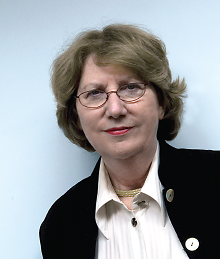For a long time, the psychiatric community has had a mixed understanding of grief. The concept of grief as an important part of dealing with loss was well recognized, and a trained professional could easily identify someone going through the grieving process. But, as M. Katherine Shear, M.D., the Marion E. Kenworthy Professor of Psychiatry at Columbia University, pointed out, “What wasn’t covered during my training—and something that I think is still lacking—was a discussion of what grief itself actually entailed.”
“What sort of forms does [grief] take? How long do we expect it to last? And importantly, is there a point at which grief becomes problematic?” Shear continued.
Such questions were daunting, but ones that many medical professionals at the time did not focus on because they ascribed to the same mantra found among the general public: everyone grieves in his or her own way.
Shear, however, was determined to come up with answers to her questions about grief. For the past two decades, she has been leading efforts to delineate the line between healthy and unhealthy grieving and develop a strategy to treat “complicated grief” (CG).
The efforts of Shear and her colleagues are beginning to pay off; complicated grief is now recognized in DSM-5 as a disorder in need of further study (tentatively named persistent complex bereavement disorder), and it is set to be described in the upcoming 11th edition of the International Classification of Diseases (as prolonged grief disorder). In addition, Shear developed a successful behavioral intervention—complicated grief therapy, or CGT.
“It’s impressive to see how far we’ve come,” said Charles Reynolds III, M.D., an endowed professor of geriatric psychiatry at the University of Pittsburgh Medical Center (UPMC). He has worked with Shear in this area since the early days. “We now recognize complicated grief as a serious condition that affects about 1 in 10 people who experience a loss; it does not go away by itself, and it is a risk factor for both suicidal ideation and cardiac disease.
“But we also now have a targeted therapy, an active body of ongoing research, and we have made progress in clarifying the diagnostic criteria,” Reynolds continued. “It wouldn’t surprise me to see complicated grief fully recognized in DSM-5.1.”
Complicated Grief Is Complex Amalgam
The diagnostic specifics are still being worked out, but at its core, complicated grief is characterized by intense grieving that is both persistent (currently 12 months or more for an adult or six months or more for youth) and impairs a person’s ability to function.
While previously viewed as a form of depression that stemmed from the loss and bereavement, these incidences of persistent and problematic grief also displayed signs of adjustment disorder and posttraumatic stress disorder (PTSD), Shear observed. So in devising a targeted therapeutic strategy, she reached out to several experts for help, such as Ellen Frank, Ph.D, who was using interpersonal therapy (IPT) to treat depression in the elderly, and the University of Pennsylvania’s Edna Foa, Ph.D., a leader in PTSD. Foa had developed a treatment known as prolonged exposure, which encourages patients to remember and engage with the traumatic events rather than avoid them.
The team infused elements of these different approaches to create a targeted intervention for complicated grief. While patients enrolled in pilot studies of CGT did report improvements in mood, the researchers discovered that many patients dropped out after the first few sessions.
After reflecting on these results, Shear had an epiphany—complicated grief was not about depression and loss; it was an expression of love.
“When we grieve, we are expressing a desire to be with our lost loved one,” she said. “And the thoughts that trigger the outward symptoms are often positive, not just negative.”
Over time, the reactions aroused by those thoughts dissipate—but in the case of complicated grief, the stimulus remains strong. “That led me to consider the angle that complicated grief might be a form of craving bearing some resemblance to substance abuse,” Shear said.
Working with that notion, Shear sought out another UPMC colleague, Allan Zuckoff, Ph.D., a psychologist who was using motivational interviewing (MI) to help people with substance abuse problems commit to treatment.
The strategy for MI is to work collaboratively with patients to explore and resolve their ambivalence about changing their behavior—in the case of complicated grief, ambivalence is about acknowledging the finality of the loss.
“I had seen the potential of MI to resolve ambivalence for a variety of problems, and when Kathy approached me about joining her group, I was fascinated by the idea of engaging people to move on from loss,” Zuckoff told Psychiatric News.
People with CG worry that if their grief goes away, they might forget the person who died or that it reflects that they didn’t love the person as much as they believed, Zuckoff explained.
“An important aspect of the CGT process is affirming that we are not trying to extinguish the grief,” Zuckoff said. “We want people to be able to access memories of their loved one, but in a way that is more controlled and less dominated by pain.”
CGT May Offer Benefits Over IPT, CBT
Shear and her colleagues have carried out three large, randomized clinical studies with CGT, and the results have been impressive so far. A 2005 trial involving 95 middle-aged adults (average age 49) found that CGT was nearly twice as effective as interpersonal therapy (IPT), with a 51 percent response rate compared with 28 percent, respectively.
This past November, a follow-up trial of 151 older adults (average age 66) found a similarly marked improvement, with CGT having a 70 percent response rate compared with 32 percent for IPT.
The recent work is critical. “CGT is gaining wide acceptance,” Shear noted, “but there are still some professionals who question why you would encourage people to revisit their traumatic loss, which can be a painful experience,” she said. “And there has been reluctance to try CGT in geriatric populations. These latest findings have been very positive in that regard.”
A few weeks after her study, researchers in Australia found that cognitive-behavioral therapy (CBT) coupled with prolonged exposure was more effective at treating complicated grief than CBT alone, validating that revisiting the loss of a loved one is a crucial part of the CG healing process.
As experts continue to examine the benefits of CGT, they continue to search for potential risk factors for CG. A number of studies have suggested higher rates of CG among people who have experienced sudden and violent deaths, such as military personnel, while a recent study in Palliative Medicine found that preexisting depression may increase the risk of CG in older adults.
Shear is currently leading a large, multicenter trial of over 400 participants to examine the efficacy of antidepressants alone or in combination with CGT.
While the trial keeps her busy, Shear is focusing most of her time in 2015 on dissemination. She recently penned a feature in the New England Journal of Medicine and is engaged in rolling out CGT to primary care clinics throughout New York state. “We need to make the public aware and get therapists trained,” she said. ■
“Complicated Grief” can be accessed in the January 8, 2015,
New England Journal of Medicine here.

